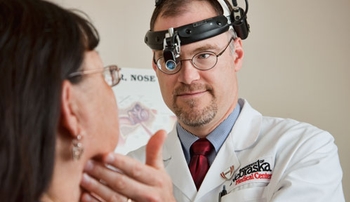A University of Nebraska Medical Center study has determined that giving head and neck cancer patients an antidepressant prior to starting treatment can reduce the incidence of depression by more than 50 percent and improve their quality of life.
Results of the study were reported in the June 20 issue of JAMA Otolaryngology – Head & Neck Surgery. Co-principal investigators on the study were William Lydiatt, M.D., otolaryngology-head and neck surgery, and William Burke, M.D., psychiatry.
The randomized, double-blind trial included 148 newly diagnosed head and neck cancer patients entering treatment who did not yet have a diagnosis of depression.
Half the patients received escitalopram, an antidepressant with the trade name of Lexapro. The other half received matching placebo pills.
 |
William Burke, M.D. |
|
|
Only 10 percent of patients taking the antidepressant developed depression, compared to 24.6 percent of patients on the placebo. Also, patients who took the antidepressant and completed the study without developing depression rated their overall quality of life as significantly better than those in the placebo group for three consecutive months after ending treatment with the antidepressant.
“We think this has the potential to change the treatment guidelines for head and neck cancer patients,” said Dr. Burke, noting that this was the first study to ever address the issue of depression in cancer patients.
“It’s important that cancer patients avoid becoming depressed. We think that the antidepressant medication is helping to improve the resiliency of these patients who are in a stressful and challenging position. Overall, this improved resiliency can help them better deal with their cancer situation.”
Dr. Lydiatt said head and neck cancer patients have a three times greater risk of committing suicide than the general public.
He said head and neck cancers represent about 4 percent of all cancers. Those that are related to the human papilloma virus – a growing percentage – tend to happen to younger, healthier people and thus can have a more long-term negative effect on them.
“It’s a controversial idea to put someone on an antidepressant who isn’t depressed,” said Dr. Lydiatt, “but if you go to the prevention paradigm, it’s not much different than healthy people taking a baby aspirin to ward off a possible heart attack.”
Another finding of the study was that patients who received radiation as their primary treatment modality had a higher rate of depression than those patients who underwent surgery.

This is my first time to read about giving anti-depressive medications prior to surgery. This might be a bit controversial since people dont have the same effects to certain experiences. This may need more in-depth studies to prove this claim. Thanks! http://www.tmsproviders.com/